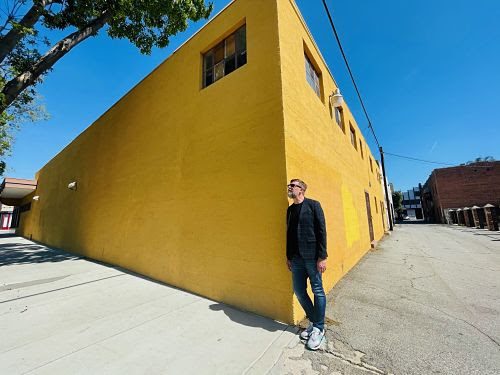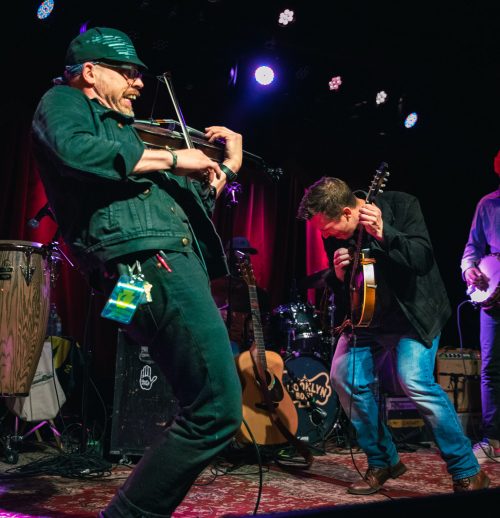Keyboardist Robert Walter is a self-proclaimed vinyl junkie, but he knows the value of digital music. So when it came time to release his latest material, he concocted a plan that brings some analog flavor to the streaming world: the digital 45, a series of six releases, each with an A side and a B side, collectively known as “Better Feathers.”
He released the fourth digital 45 — “Security,” featuring John Morgan Kimock, and B side “It’s Not What’s” — earlier this week, via Royal Potato Family records.
“I’ve always collected old records, and I’ve always liked 45s. There’s a sort of implied thing that the A side is the hit and the B side is something odd or different, but sometimes the B side becomes the focus,” says Walter. “I liked the idea of sides. One thing I missed in the CD era and the digital era, it’s just a program that can go on for however long, and there’s no feeling of side A, track 1, and what does that signify. I thought it would be a cool way to do it, and also I felt rather than drop it all at once, it allows you some time to focus on each piece.”
Walter, a long-time member of Phish bassist Mike Gordon’s band, is also working on new material with that group, and has shows booked with Greyboy Allstars, a group he co-founded with now-Rolling Stones sax player Karl Denson, all the way back in 1993. Players from that band as well as Gordon’s ensemble are among the many guests on “Better Feathers.”
What does the title “Better Feathers” mean?
The title, I guess it was just coming out of being in quarantine and trying to figure out what to do with my time, and my girlfriend was reading a book about birds, and we started talking about birds molting and upgrading their feathers, and that that was a cool analogy for what I was trying to do, sort of making something out of the situation
You often post photos of vinyl records on your Instagram, and you’ve chosen to reference the vinyl aesthetic by releasing digital 45s. What is special about vinyl?
(Vinyl) is my favorite way to listen to music. … It’s a more active listening thing, and you can’t skip tracks as easily. It forces you too look at it in a different way. When I was a kid, you put in a VHS tape, and there’s a commitment there (laughs), and maybe it was the only one you rented, so that’s your thing for the night. With digital work, it’s really easy to press skip.
The music industry has shifted back to a singles market, but we keep hearing about a resurgence in vinyl album sales. Do you get the sense that some younger people are checking out the album format?
It’s a mixed bag. I definitely know people who really love vinyl, and I know people who can’t relate to it at all — why would I bother with that at all, it takes up so much space? I tend to conceive of my music on the older model because that’s when I fell in love with music. And I did make longer albums when CDs became available, but 70 minutes is a long-ass time to be listening to somebody’s ideas. (Vinyl’s limitations) force you to edit some things, make some hard choices sometimes. It’s the same reason why we don’t watch a lot of four-hour movies. We watch a 90-minute movie, and that usually works, and it’s, in general, a nice way to digest one story.
Let’s talk about some of the guests on “Better Feathers.” Stanton Moore plays on the title song.
He’s sort of one of my most consistent and longest collaborators. He played on, I guess, my second proper album, “Money Shot,” way back in 2000, actually. So we’ve been playing together, and I play on his albums, and certain tunes I write, I always think of him and his drumming. He’s also been recording a lot when he’s at home. He’s a great ambassador of all the New Orleans concepts and a great student of all the classic drummers from there, and we connect — we’re both rock kids that dig jazz and funk, all through the filter of kids that loved Led Zeppelin and stuff.
Mike Gordon, who plays on “Saucermen.”
Well, I had this piece that was sort of a one-chord sort of jam, it was actually really influenced by Kraftwerk, bands like Can as well as Miles Davis’ electric stuff. … And Mike and I, on the road we always talk about that concept of improvisation where you’re not forcing your intention on it.
Drummer John Morgan Kimock, who is your bandmate in Gordon’s group, plays on the latest release, “Security.”
I had met him when he was much younger when I was playing with his father, Steve, and I was in that band for a few years. We had some history together. We talked about sort of what we want out of improvisation.
Photo by Julia Mordaunt




Leave a Reply